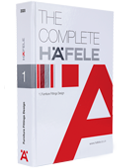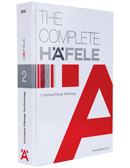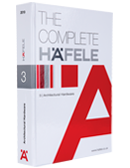CPDs & Training

Häfele joined the RIBA CPD network providers in September 2006, with the objective of promoting the correct and efficient specification of Architectural Ironmongery with decision makers and specifiers within the UK architectural and construction industry.
Our first seminar ‘The What, Why and Where of Sliding Door Gear’ was approved in 2006 and is our most popular development programme within Architect practices across the UK and Ireland. We have since gone on to release a further 4 seminars, each designed, developed and constantly-updated to ensure state-of-the-art information is always available to our delegates. We have also presented to other construction professionals including Clerk of Works, Facility Managers, Glazing Project Managers amongst others.
The duration for each seminar is approx. 45 minutes, plus questions. Please find details of the seminars offered below:
1. The What, Why & Where of Sliding Door Gear
This seminar covers:
• Understanding how sliding systems work
• The applications sliding, sliding folding and sliding stacking systems can applied to
• The mechanics of sliding door gear systems
• The advances and disadvantages of the different sliding door gear solutions
2. Specifying Door Ironmongery – A Basic Guide
This seminar covers:
• A guide to the five basic elements of specifying door hardware
• An examination of the hardware solutions used to hand, operate, lock, close and protect doors
• The building standards relevant to door ironmongery products and solutions
• Examples of door sets for common specification requirements
3. Specifying Architectural Hardware for Inclusive Design
This seminar covers:
• The various legislations covering universal access, including the Equality Act, Document M and BS8300:2009
• How to specify door hardware of accessible routes
• How to specific hardware for accessible bathrooms and changing room applications.
4. Frameless Glass Fittings
This seminar covers:
• The basic properties of glass, and the design constraints for fixings
• How to specify glass types to be used for non-structural shopfronts
• How to specify glass types to be used for interior doors
• Discussing the various options available for frameless glass designs
5. Defining Access Control
This seminar covers:
• What is access control, and what are the differences between electronic and conventional access control systems?
• The elements that make up an access control system
• The benefits of an access control system and understanding the elements that make up a system
• The applications relevant for access control online, offline or combination systems
• Overcoming the challenges of specifying an access control system
• Understanding the five elements of an access control system
• Emerging technology within access control










